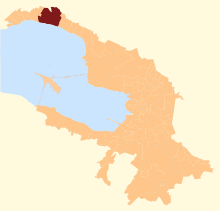Terioki
| Zelenogorsk (in English) Зеленогорск (Russian) |
|
|---|---|
| - Municipal town - | |
 Location of Zelenogorsk in Saint Petersburg |
|
|
|
|
|
|
|
| Administrative status | |
| Country | Russia |
| Federal subject | Saint Petersburg |
| Statistics | |
| Population (2010 Census) | 14,958 inhabitants |
| Time zone | MSK (UTC+03:00) |
| on | |
Zelenogorsk (Russian: Зеленого́рск; before 1948 Terijoki, a name still used in Finnish and Swedish), is a municipal town in Kurortny District of the federal city of St. Petersburg, Russia, located in part of the Karelian Isthmus on the shore of the Gulf of Finland. Population: 14,958 (2010 Census);12,074 (2002 Census);13,032 (1989 Census).
It has a station on the St. Petersburg-Vyborg railroad. It is located about 50 kilometers (31 mi) northwest of central Saint Petersburg.
From 1323 to 1721 the Zelenogorsk area was a part of Sweden. It was ceded to Russia in 1721, becoming "Old Finland", which again was united with the Grand-Duchy of Finland in 1811. Until 1917, Terijoki was part of the Grand-Duchy of Finland, ruled by the Grand Dukes of Finland, who were the Tsars of Russia, (1812–1917).
Even though all of Finland was part of the Russian Empire, a customs border was located at Terijoki. A valid passport was needed for crossing the border between Russia and the Grand Duchy of Finland.
Vladimir Lenin managed to travel in secrecy over the internal border to Finland in 1907. Ten years later, in April 1917, he would return through the Terijoki border control at the head of the contingent of Bolshevik exiles that had accompanied him from Switzerland.
...
Wikipedia


